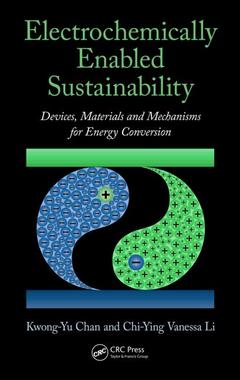Electrochemically Enabled Sustainability Devices, Materials and Mechanisms for Energy Conversion
Coordonnateurs : Chan Kwong-Yu, Li Chi-Ying Vanessa

Electrochemically Enabled Sustainability: Devices, Materials and Mechanisms for Energy Conversion covers topics related to current research in electrochemical power sources, highlighting some of the latest concepts in electrochemical conversion for sustainability. The book examines the most recent and innovative technologies employed in battery and fuel cell technology. It introduces the fundamental concepts applied to these electrochemical power sources and provides in-depth discussion on the materials, design, and performance of these devices.
Written by internationally acclaimed experts, the chapters illustrate how key technologies for sustainability are enabled by electrochemical conversion. Topics include the reduction of carbon dioxide to resolve issues of carbon capture, energy storage, and generation of portable fuel; turning waste into energy using microbial fuel cells; the promise of vanadium redox flow batteries for massive energy storage; and improved performance of hybrid devices. The book addresses numerous aspects of lithium-type batteries for vehicle propulsion and energy storage, presenting a broad range of lithium batteries, and considering nano-structuring issues, layered-structure materials, and hierarchical structure.
This book provides timely coverage of critical issues in emerging and conventional technologies, presenting a wide range of electrochemical devices, related materials, and operation mechanisms. It stimulates an appreciation for the novelty of these electrochemical power sources and offers a projection of future integration of these devices in practice.
Electroreduction of Carbon Dioxide. Microbial Fuel Cells and Other Bio-Electrochemical Conversion Devices. Lithium Batteries: Status and Future. Hollow Mesoporous Carbon with Hierarchical Nanoarchitecture in Electrochemical Energy Storage and Conversion. Layer-Structured Cathode Materials for Energy Storage. First-Principles Approach for Cathode Design and Characterisation. Advanced Batteries and Improvements in Electrode Materials. Lead–Carbon Hybrid Ultracapacitors and Their Applications. Vanadium Flow Batteries: From Materials to Large-Scale Prototypes. Physical Properties of Negative Half-Cell Electrolytes in the Vanadium Redox Flow Battery. pH Differential Power Sources with Electrochemical Neutralisation. Index.
Kwong-Yu Chan, Ph.D., joined the Department of Chemistry, University of Hong Kong in 1988 and was promoted to full professor in 2002. Professor Chan has fundamental and applied research activities in molecular simulation, fuel cells, materials, and electrochemical applications. He has published over 150 papers and is a top 1 percent cited scientist, according to ISI’s Essential Science Indicators. Professor Chan has five inventions on the topics of fuel cells, ozone generation, and batteries.
Chi-Ying Vanessa Li, Ph.D., joined the Department of Chemistry, University of Hong Kong, as a postdoctoral fellow in 2009. Dr. Li’s current work focuses on electrochemistry and catalysis. Her research interests include anode materials on lithium batteries, flow batteries, and MOFs (metal-organic frameworks) for catalytic applications. She has published over 20 articles in various peer-reviewed journals.
Date de parution : 07-2014
15.6x23.4 cm
Thèmes d’Electrochemically Enabled Sustainability :
Mots-clés :
American Chemical Society; Energy Density; Carbon diioxide reduction; MFC; Electrochemical power source; Cathode Materials; Lithium ion battery; Graphite Felt; Fuel cell; Microbial fuel cell; LIBs; Sustainability; Li Ion; Ultracapacitor; CO2 Electroreduction; Energy storage; Ap Ac; Energy conversion; Ce Ll; Battery technology; Rechargeable Lithium Batteries; Anode Material; Air Cathode MFC; Lead Acid Battery; Lithium Air Battery; Sulphuric Acid Concentration; Single Chamber Air Cathode; Electrochemical Capacitors; Transition Metal; MFC Performance; Vanadium Ions; PEM; Bpm; Irreversible Capacity



